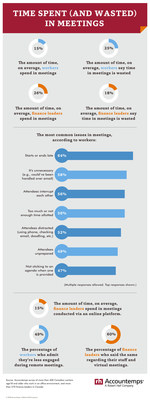Jillian Levick
Senior PR and Communications Manager
Robert Half Canada Inc.,
181 Bay Street, Suite 820,
Toronto, ON
M5J 2T3
www.roberthalf.ca
Press Releases
Read about our latest research, including results from our ongoing surveys of senior managers and workers, and company announcements.

- On average, workers spend 15 per cent of their time in meetings and feel 25 per cent of it is wasted
- Common issues include starting or ending late, unnecessary meetings, people interrupting, and poor scheduling
- Nearly half of workers say they're less engaged when they join a meeting remotely
TORONTO, July 31, 2018 /CNW/ - Love 'em or hate 'em, meetings are an essential platform for sharing information, brainstorming new ideas and collaborating as a team. But are meetings always necessary? It doesn't seem so, finds new research from Accountemps. Professionals surveyed said they spend 15 per cent of their work hours in meetings but feel a quarter of that time is wasted.

Responses from finance leaders show slightly more of their time (26 per cent) is spent in meetings, and they feel 18 per cent of that is unproductive.
Workers cited the most common issues in meetings include:*
|
Starts or ends late |
64% |
|
It's unnecessary (e.g., could've been handled over email) |
58% |
|
Attendees interrupt each other |
56% |
|
Too much or not enough time allotted for the meeting |
56% |
|
Attendees distracted (using phone, checking email, doodling, etc.) |
52% |
|
Attendees unprepared |
49% |
|
Not following an agenda when one is provided |
47% |
|
*Top responses only. Multiple responses allowed. |
Additional findings:
- Forty-nine per cent of workers admitted they're less engaged during remote meetings, while 60 per cent of finance leaders said the same regarding their staff.
- Finance leaders said, on average, that 15 per cent of their meetings are conducted through online meeting platforms.
"While meetings can be valuable opportunities for staff to share insights and collaborate, issues like poor planning or lack of focus often leads to drawn-out, repetitive and unproductive discussions," said David King, Canadian president of Accountemps. "It's important that meeting managers establish clear objectives, stick to a concise agenda and follow up with notes or next steps to ensure an efficient and constructive use of everyone's time."
Accountemps offers the following ways to remedy the biggest meeting issues:
For meeting planners:
- Consider alternatives. If all you need to do is give brief updates, email will suffice. But when you want to build consensus, get buy-in or find solutions — anything that requires a discussion — meetings are the way to go.
- Limit attendees. Invite only those that need to participate. Smaller meetings tend to run more efficiently than larger ones.
- Time it right. There's no rule that meetings must be scheduled in 30-minute increments. Consider 15- or 45-minute sessions if you can cover everything in a shorter period.
- Meet in person. Phone conferences are practical, saving companies time and money. But for long-format meetings, when you need everyone's attention and participation, bring staff in-house.
- Create an agenda. Structure can set expectations and save time. Assign owners to topics and let them know the allotted timeframe they have to speak. Send the agenda out in advance so participants can contribute to the meeting.
For attendees:
- Be prepared. Nothing wastes more time than attendees who aren't ready to speak, don't have the right handouts or must search their computer to find information.
- Arrive on time. When you're late to a meeting, other participants must either wait for you (which wastes time) or start without you (causing you to miss vital information).
- Pay attention. It's poor workplace etiquette to focus on your phone or laptop while others are speaking. When you listen intently and ask good follow-up questions, not only will you leave better informed, but you'll also impress your boss and colleagues.
- Take turns. There's nothing more frustrating than people talking over each other. If you start speaking after someone else does, be gracious and yield the floor to them.
About the Research
The surveys were developed by Accountemps and conducted by independent research firms. They include responses from more than 400 workers 18 years of age or older and employed in office environments, and more than 270 finance leaders from companies in Canada.
About Accountemps
Accountemps, a Robert Half company, is the world's first and largest specialized staffing service for temporary accounting, finance and bookkeeping professionals. The staffing firm has more than 300 locations worldwide. More resources, including job search services and the company's blog, can be found at roberthalf.ca/accountemps.
SOURCE Accountemps
